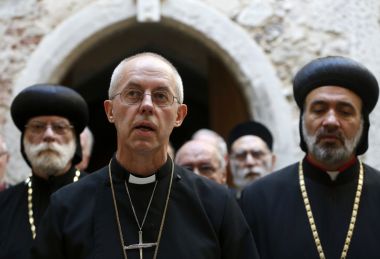Justin Welby to persecuted Christians: 'God feels our suffering, our horror, our sadness'

Christians must stand with those being persecuted by Islamic State in the Middle East, and remember that God weeps alongside those who are suffering, the Archbishop of Canterbury has said.
In an interview with SAT-7's Imed Dabbour, Justin Welby described the situation in Iraq and Syria as "the worst...that has been faced for centuries". He referenced Catholic Patriarch Louis Raphael Sako, who said last year that Christians were facing the worst treatment since the invasion of Genghis Khan.
"It is essential to say there are no easy solutions; what we're seeing today is the build-up of a situation that has been preparing itself for a very, very long time," Welby said. "But we must start as Christians by saying we must look for ways of standing with our sisters and brothers in the Middle East.
"We [the Anglican Communion] have churches right across the Middle East – in Beirut, Cairo, Baghdad, even Damascus – and so we look for ways in which through those links and through our friendship with Christians in the Middle East, we can support and help."
The starting point for Christians, however, has to be the hope we have in Jesus, Welby said, "because without that we have nothing at all... We always start with Jesus because that's where everything starts. And we start by remembering that God raised Jesus Christ from the dead, as Paul reminds us, and if he raised Jesus he will raise us. That's the fundamental truth on which we stand."
The Archbishop added that he has been speaking with governments and other bodies, including the European Union, for months on behalf of persecuted Christians, and that they are listening to the concerns of faith leaders. "They are looking for different ways of approaching the question. So our government is listening very actively to the Church, as is the opposition."
He spoke of his own responsibility to speak out for the oppressed, but said that with it comes "a deep sense of powerlessness to fulfil that responsibility". He prays every day, "but finding ways forward that will end the terrible suffering of the people escapes us at the moment."
Dabbour noted that Welby has advocated passionately on behalf of people of all faiths and none who are facing terrible atrocities at the hands of ISIS. "The people who suffer most are the poor, regardless of their faith," Welby said. "They get caught up by terrorism, by bombs, by these terrible movements such as ISIS that destroy indiscriminately all those who they don't like." The poor are beytrayed by these movements, he added.
The question of where God is in the midst of such tragedy is "the most profound question we are ever asked," the Archbishop went on to say. It is vital that Christians don't try to give "cheap answers", but instead are called to weep alongside those who are hurting. He spoke of the death of his seven-month-old daughter, Johanna, in a car crash in 1983, and a verse in the Psalms that his wife found at the time which says "God stores up your tears in a bottle" [Psalm 58:8].
"In other words the tears we weep are not lost, they are not forgotten; they are held in the memory of God," Welby said.
"I think my understanding is: where is God? God is in the middle of it, suffering alongside us as his son suffered on the cross. He stores up our tears in a bottle. Why did these things happen? There are no easy answers...but we know that Jesus died on a cross, the son of God himself in agony and torture, and was raised from the dead, and our hope is that he will deliver us."
The Archbishop said that he didn't question the existence of God when Johanna died, but has "once or twice" since, one time in particular when his eldest son was seriously ill. "There have been moments where I say 'God where are you?' There's one of the Psalms where the psalmist says [to God] 'Are you asleep? Wake up!' Now... if the psalmist himself can say that, we can say it. We can say to God 'I don't know where you are in this situation.'
"He sees our hearts so what's the point in hiding it? If we're angry with God, it's better to say it, and see what he says back," he said.
Welby also used the powerful illustration of Jesus weeping over the death of Lazarus. "This was a God who is not far off, cold and indifferent, but a God whose arm is around us, who is compassionate, who feels deeply within the being of God our suffering, our horror and our sadness," he said.
"We see who God is when we see Jesus on a cross, or in the Eucharist, the Communion. When we break the bread, we break the body of Christ [and] we see the immense 'being with us' of God - Emmanuel, God with us.
"Not just at good moments, but at the darkest, most terrible moments of all. And even at the moments when we shout at him and say 'How can you do this to me? How can you let this happen? You've betrayed me'...God still loves us, he never turns away from us."











